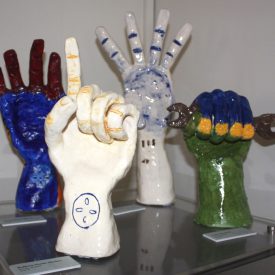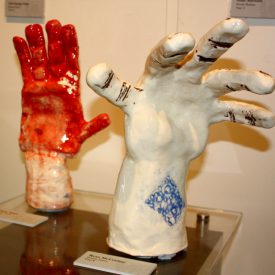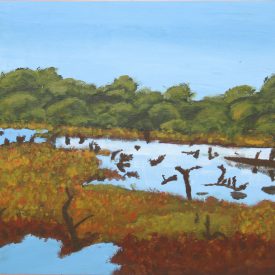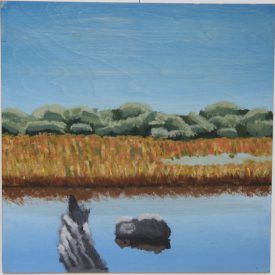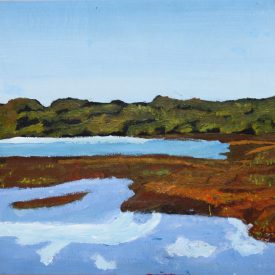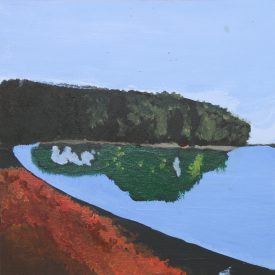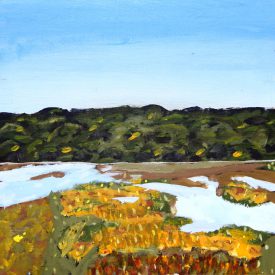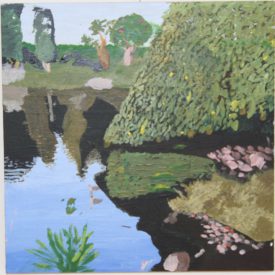Protect and Serve
Sam Joyner, Year 12
Blue. Red. Blue. Red. The lights still flashed before my eyes. The screams still rang in my ears. The tear gas still filled my lungs, stung my skin, burned my eyes and seared my tongue. Somehow, the worst pain was still the police batons cracking down on my torso, neck and skull. The gravel digging into my skin as I tried to escape the pain, to no avail. White men in riot gear defending the Republican senator from Texas. Black men and women against the gates of his six-million-dollar estate, holding up phones as candles in silent protest. “Suspicion of collusion and/or masterminding in relation to various hate crimes,” was the official reason I now sat in the interrogation room of the Austin Police Department. The real reason was “of dark skin.” I glanced toward the observation room where I am sure there were a score of them, conspiring, planning, devising some way to lock me up with no crime committed. It was as I glanced that I first saw my reflection. Bruises ran across my face, my shoulders and down my arms. A patchwork of colours. Purple. Red. Yellow. Blue. Red. Blue. Red.
The opening of the door startled me from my reveries. A corpulent, white man sauntered in. I estimated him old, maybe sixty. He was near bald, but tried to cover it with a dreadful comb-over. Dead shark eyes peered out from beneath a spray tan that appeared plastered on. His uniform was faded, yet still with some semblance of the blue it once was. He looked at me and a smirk crept onto his face. He even chuckled slightly as he came to plant his blubber on the seat opposite me. It nearly buckled under the weight. I kept my eyes looking anywhere but at the beady black eyes of the officer who was now casually reclining in the metal chair across from me.
“Ya know boy, I weren’t too sure when Jimmy walked up and, oh Jimmy, well you know he’s a God-lovin’ American, and he says to me, he says: ‘Christmas has come early for ya this year, Earl!’ and heck, ya know I didn’t nearly believe him, but walkin’ in here to find a, uh, whadya people call yerselves these days, uh, a ‘negro’ boy like yerself, well it’s just too darn good to be true!” He wheezed with laughter for a second before it transitioned quickly into a vicious cough that shook his whole body. I clenched my fists and scrunched my toes, but my staunch expression didn’t waver. I’d met enough men like Earl in my lifetime to understand what confrontation of any kind would warrant me. He grabbed some papers from the table and began to sarcastically peruse them.
“‘Given names: James, Michael. Family name: White.’ Ya know boy, I think that’s what they call ‘ironic!’” He chuckled again, but stopped himself when he began to cough. I could tell he was proud of his extensive grasp of English vernacular. “‘Born 1992 in Austin, Texas.’ Ah a local boy I see, ‘Graduated University of Texas, Austin, with a degree in law, 2016’ and heck look at that, you were near top of yer class. The rest of the file is pretty borin’ stuff, ya know, ‘Mother died at four; murder; unsolved.’ Ooh sorry to hear about that one, boy.” His smile suggested otherwise, which caused my leg to shake uncontrollably in pent up anger. “Well, pretty borin’ with the exception o’ one thing.” He cleared his throat and I clenched my fists harder. I could see my hands in front of me, and my fingers began to turn white as my nails dug into the veins that now began to bulge from my skin. “It says here, and this is very interestin’, so pay attention, it says ‘Father incarcerated at age 7 until age 19, then AGAIN at 21, sentence of 15 years. Charges of assault and battery of a police officer, two accounts, and obstruction of justice.’ And you’re here for violent hate crimes. Well boy, it looks like it runs in the family!” He started wheezing again looking at the mirror where I could see only myself and Earl, but where I could hear at least three more men cackling just as boisterously. It was then that the white room turned red.
I slammed my fists on the table, clanging the cuffs that shackled me to the table, and Earl looked away from the mirror and stopped laughing. But he didn’t stop smiling. If anything, he looked more amused now than anything else.
“My father was innocent! He didn’t do any of that! He only hit the police officer because he insulted him! That man was racist and should have been the one locked up! You say I’m here for violent hate crimes, but I stood there with hundreds of other TRUE Americans peacefully! We didn’t hurt anyone, we didn’t assault anyone, we protested a corrupt government official who has imprisoned more black Americans than any other American since the Goddamn Civil War!” The smile only grew on his face as I got more enraged.
“Well, listen boy, that’s all well and good, but just quietly between you and me, I get paid more if I arrest more people, and the worse the crime the better it is for me. So you can burst a blood vessel or two gettin’ angry with me, but it ain’t gonna do you no good. We’ll send ya off to jail regardless of yer crimes, cuz let’s be honest,” he looked back to the window as though for confirmation from his cronies, “any sane judge who sees a nig-”
Before he could talk further, I snapped the cuffs tying me to the table, and with a roar leapt on top of the man and started pummelling his face; the further I went, the harder I hit, until blood poured down his face, and across his uniform. Hands pulled me away, and I saw Earl’s damaged face, engorged and swollen, as his was dragged away to be tended to.
“Yer goin’ to jail for a long time, boy! A long time! And if I got anythin’ to say about it, you won’t ever be getting’ out!”
As I felt another pair of cold steel cuffs being clasped around my wrists, I realised: I’d committed a worse crime than my alleged, this was only going to get him more money, and he would be hailed a hero. Before I too was hauled away, I got one last glimpse of Earl and his faded blue uniform. Or rather, faded blue and red.

